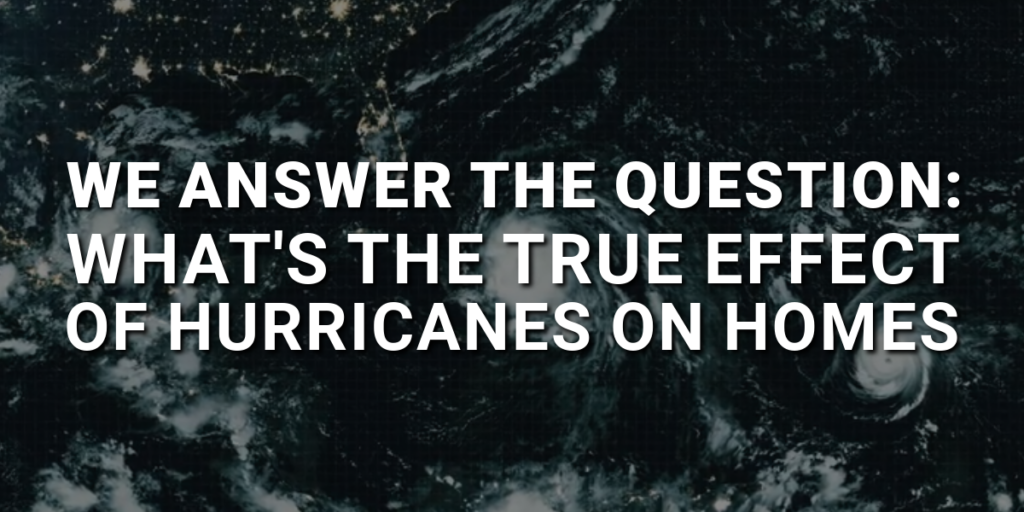Hurricanes are well known for causing destruction. But if you’re new to the “hurricane zone” or homeownership in general, you may not be too familiar with the specific types of damage they cause.
How do hurricanes affect homes? The answer depends on the storm’s strength and how well your home is built. It’s not unusual for a category 4 or 5 hurricane to completely demolish a house. But in most less-severe cases, you can expect to find one or more of the following kinds of damage.
Equipment and Appliance Damage
Outdoor equipment and appliances don’t fare well in hurricanes. It’s common for air conditioners to be damaged by flying tree branches and debris. Pool pumps and heat pumps can be dented, too. To protect these appliances, install hurricane cages around them. These are strong metal boxes anchored into the ground, covering their contents from debris.
Landscaping Damage
Landscape damage may not seem like a big deal, but re-surfacing and replanting your garden beds is a lot of work. To minimize landscape damage, use rocks over mulch. Choose trees and plants which can withstand flooding and strong winds. And if you have palm trees on your property, trim them before hurricane season arrives. Doing so will protect the trees and the surrounding homes and structures.
Siding Damage
Stucco and vinyl siding are both pretty common in Florida. Both are relatively sturdy but no match for the strongest hurricanes. You may come home to find missing or cracked vinyl siding, which must be replaced. Signs of stucco damage include alligator skin-like cracks, discoloration, and crumbly sections.
Siding exists to protect your home; without it, your interior walls will be prone to water damage. So don’t delay in having the siding damaged repaired after a hurricane. Have a water damage restoration company look over your space, too. Some water may need to be removed before the home can be resided.
Utility Damage
When you return home after a hurricane, you might find the power is still out. It’s common for electrical lines to go down. Utility companies won’t turn the power back on until they’ve made repairs and ensured everything is safe. There may be a boil water order for a few days, too. Gray water and sewage can get washed into clean water reservoirs during a hurricane, and it can take a while for the water treatment plants to catch up.
Window, Door, and Interior Damage
Window damage is one of the worst kinds of damage a home can suffer in a hurricane. And this is not just because the broken glass makes a mess. Once one window blows out, water and debris will get blown in, causing damage to your interior structures. The change in pressure from one broken window can cause another to crack, too.
Shatter-proof windows or hurricane windows give you better protection during big storms. Plus, as strange as it sounds, having a good, solid roof reduces your risk of window damage during a hurricane. If your roof is not well attached and lifts off your home, this can cause a change in pressure which causes windows to shatter. Proper hurricane straps help keep the roof in place so this does not happen.
How Do Hurricanes Affect Homes: The Roof
In addition to window damage, roof damage is the other main destruction to watch out for after a hurricane. In the worst-case scenario, the roof may lift off the home completely. This usually causes the entire house to be destroyed beyond repair. Hurricane straps go a long way toward preventing this. They can be added after the fact. So, if you are not sure whether your roof is attached to hurricane straps, have a roofer take a look.
Shingle roofs often lose large patches of shingles in a hurricane. In this case, you want to have the roof tarped off ASAP to prevent or minimize leaks. A roofer can then either replace or repair your roof. Their approach will depend on the damage’s extent and the roof’s age.
Tile roofs tend to fare better in hurricanes. However, you may still have some cracked or missing tiles due to tree branches and other debris landing on the roof. Have tile roofs repaired promptly. Even if you don’t see any water inside, water will come into contact with the underlayment and cause premature wear.
Hopefully, you now have a better idea of how hurricanes can and do affect homes. Make sure your home is protected by a strong roof installed according to the latest building codes. Contact StormForce if you’re looking for a dependable roofing company in the Jacksonville area. We work hard to keep Florida residents safe.
